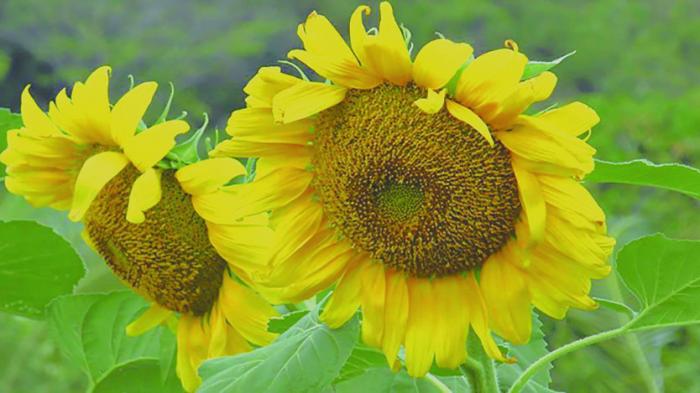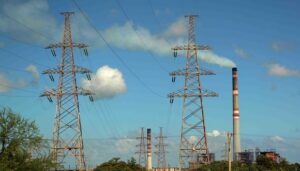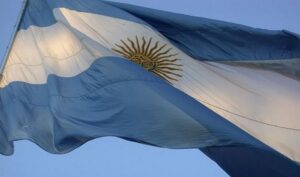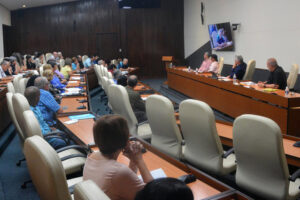With innovative techniques, Avilanian farmers are leading an essential movement to substitute imports and strengthen national and provincial economic resilience
Far from traditional monocultures, the fields of Ciego de Ávila are diversifying with a promising green-yellow: oilseed plants are experiencing a productive and significant leap.
With innovative techniques and the recovery of previously underutilised lands, Avilanian farmers are leading an essential movement to substitute imports and strengthen national and provincial economic resilience.
It is for this reason that, guided by the territory’s senior political authorities and hand in hand with the agricultural sector, the idea is gaining strength and, far from stalling over time, it is developing, despite blockades, resource limitations, and some dissatisfaction regarding the speed of planting these plants, an alternative for stepping up the pace in the search for the much-longed-for food sovereignty.
The provincial oilseeds programme took root in 2024 with a clear objective: to reduce dependence on imports of edible oils through the cultivation, fundamentally, of sunflower, sesame, and soy, without ruling out others like peanuts, the latter also having a tradition in the territory.
The municipalities leading the way are Ciego de Ávila (223 hectares), Baraguá (175), and Ciro Redondo (116), while Majagua (62), Chambas (51), and Florencia (31) need to get the programme better on track.
STORY FOR A BEGINNING
The agronomist engineer Rolando Macías Cárdenas, a prominent usufructuary of the UEB for various crops El Mambí, in the community Tercer Frente Oriental, in the municipality of Ciego de Ávila, was one of those who took a risk and planted nine hectares of sunflower after the potato crop.
«I consider it was a bold act, because we had never dedicated ourselves to that crop before. We didn’t know the intricacies, only those learned in an initial seminar given by professors from the Máximo Gómez Báez University, plus the experience of some producers.
«The oilseed plant planting project is a good idea, with the purpose of resolving the oil needs of the population of Ciego de Ávila; it’s great because if we achieve self-sufficiency and produce it under our conditions, we would save the country considerable volumes of money. It is another step in import substitution and the search for food sovereignty. That’s why we have to set ourselves tasks like this, that solve problems and, at the same time, improve producers’ incomes.
«We decided to plant sunflower, because it is a hardy crop, although not everything went as we wished, as we country folk say. The lack of electricity affected us a lot. We practically couldn’t irrigate the plantations. Luckily, pests did not attack. We kept analysing the behaviour and in the nine hectares we managed to obtain six tonnes of seeds, a yield we can improve, if we consider that the literature states that commercial sunflower crops usually have a yield of two to three tonnes per hectare, although it can range from less than one tonne to more than four; they can even reach more than six tonnes per planted hectare, if all the cultural practices are guaranteed. If we want the programme to continue successfully, we must ‘tie up’ a number of things that still affect it, such as selecting the best seeds of the best variety and guaranteeing a technological package with the minimum indispensable conditions to not plough barren land.
«The other difficulty the programme has is commercialisation,» a reality also agreed upon by other producers questioned by Granma. In the beginning, that issue was left a bit up in the air, assures Macías Cárdenas, but it must be resolved in the coming harvests, according to the priorities given to the matter by the senior political and Agricultural leadership in the province. This first foray was not as successful as we hoped, but it did not give us economic losses and that encourages us to continue.»
Roberto Perdomo Díaz, on his farm La Victoria, belonging to the CCS Ciro Redondo, in the municipality of the same name, is one of the faithful convinced of the benefits of developing these plants and planted five hectares of sunflower and the same of peanuts, a figure higher than the two initially planned.
Like Macías Cárdenas, the producer Perdomo Díaz recognises that the deficit of inputs, fuel, fertilisers, and machinery constitute burdens and limit scalability. «but we must fight against all that, because we cannot let die what was born with so much effort and we all need.»
Although initially the province’s programme includes, fundamentally, sunflower and sesame, digital sites account for the broad use of oilseeds, among which also appear olives, almonds, cotton, and flax, among other varieties.
Similarly, many of them are the ideal ally to combat health problems like diabetes, cardiovascular diseases, and malnutrition, in addition to the oilseed family being one of the large crop groups with the greatest production, research, experimentation, and worldwide commercialisation.
SEEDS OF CHANGE
With the extension of the programme, investigative projects are beginning to emerge in the different scientific centres of the territory, which develop innovative technologies to promote sunflower cultivation, like the one being developed by Javier González, deputy director of Research at the Centre for Environmental Engineering and Biodiversity (CIBA), using beneficial native microorganisms (MAB) isolated from local ecosystems.
These biofertilisers are applied combined with worm humus and bovine manure, seeking to maximise the production of seeds for edible oil and to utilise the residues from the sunflower cake in animal feed, established science of proven effectiveness in these crops.
The technology is being validated in more than 30 hectares of demonstration farms in state enterprises and productive units like La María, Rincón Los Hondones, and the Provincial Party Self-Supply Farm, another step in consolidating the Food Sovereignty and Nutritional Education Programme that the country is developing to achieve a sustainable future.
The promotion of these crops has generated new sources of employment for women and young people, linked to activities of planting, treatment of the plantations, harvest, and grain processing.
Similarly, the first oil extraction machines are beginning to appear, like the one devised by innovators from the Bolivia Agroindustrial Enterprise, together with specialists from the Turiguanó Genetic Livestock Enterprise.
«Alongside this, producers are looking for other solutions to acquire them on the international market and there are projects for the commissioning of higher capacity extraction plants, so that the productions do not remain in the field and the programme dies, a programme that was born to stay,» confessed to this newspaper the engineer Humberto Ortega González, deputy delegate of Agriculture in the province.
The obtaining of oil from oilseed plants in Ciego de Ávila will only be synonymous with food sovereignty when the production levels allow for satisfying the product demand to a certain extent, and it reaches, above all, the kitchens of households. The first seeds are taking root. The path is still long.




